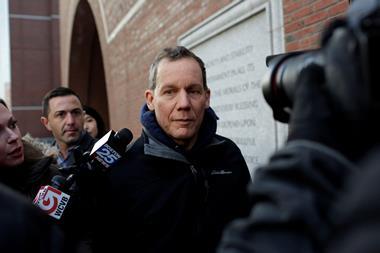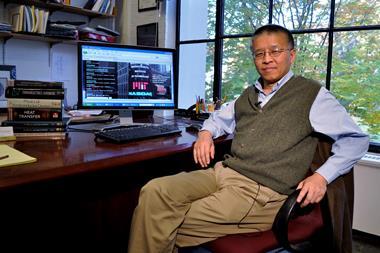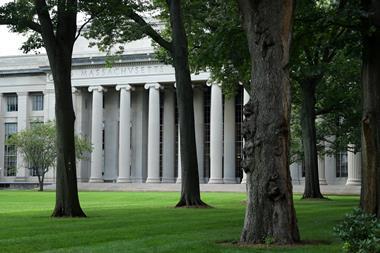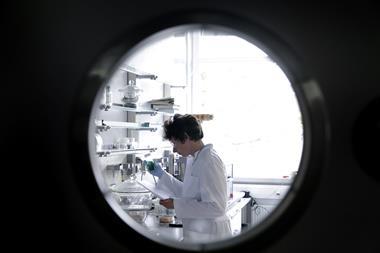The US Justice Department has charged another professor at an American university with committing research grant fraud to benefit China. Ohio State University’s Song Guo Zheng used more than $4 million (£3.2 million) in grant money from the US National Institutes of Health (NIH) to develop rheumatology and immunology expertise for the Chinese government, according to a criminal complaint unsealed following his 9 July detention hearing.
The 57-year-old Zheng has also allegedly been a participant in the Chinese government’s Thousand Talents programme – a scheme to recruit and cultivate high-profile scientists – since 2013. He is charged with making false statements about maintaining employment in China at the same time he was working for US universities. Zheng, who was previously at the University of Southern California and Pennsylvania State University, faces up to 15 years in prison if convicted.
Zheng was arrested on 22 May at an airport in Alaska while preparing to board a flight to China. He had with him two laptops, three mobile telephones, several USB drives, several silver bars, expired Chinese passports for his family, as well as deeds for property in China, according to the Justice Department. Ohio State University spokesperson Ben Johnson says Zheng is currently on unpaid leave and that the university is ‘proceeding towards termination’. Zheng has been denied bail as he is considered a flight risk.
‘Yet again, we are faced with a professor at a US university, who is a member of a Chinese talent plan, allegedly and deliberately failing to disclose his relationship with a Chinese university and receipt of funds from the Chinese government in order to obtain millions of dollars in US grant money designed to benefit the health and well-being of the people of the US,’ said US assistant attorney general for national security, John Demers.
Recent cases
David DeVillers, US attorney for the Southern District of Ohio, said that this is his office’s third recent case involving the illegal transfer of intellectual property and research to China.
A number of researchers in the US have faced similar charges in recent months, the most prominent being Charles Lieber, the former chair of Harvard University’s Chemistry and Chemical Biology Department. He was indicted last month for making false statements to the authorities about his participation in the Thousand Talents programme.
Lieber allegedly concealed from both Harvard and the NIH his position as a strategic scientist at a Chinese university – and the fact that the Chinese government was paying him, through the Wuhan University of Technology, a $50,000 monthly stipend, more than $150,000 in living expenses and more than $1.5 million to establish a laboratory in China. After his arrest in January, Lieber pleaded not guilty in June to two counts of making false statements.
Other lower-profile scientists have also been arrested over undeclared involvement in the Thousand Talents plan. In May, the Justice Department arrested Qing Wang, a former researcher with the Cleveland Clinic who worked on molecular medicine and the genetics of cardiovascular disease, and Simon Saw-Teong Ang, a University of Arkansas scientist conducting research for Nasa. ‘Both were allegedly committing fraud by concealing their participation in Chinese talent recruitment programmes while accepting millions of dollars in American federal grant funding,’ said the director of the Federal Bureau of Investigation (FBI), Christopher Wray, during remarks earlier this month to the Hudson Institute, a conservative thinktank in Washington DC.
Grant recipients probe
Other cases include those of former Emory University neuroscientist Xiao-Jiang Li who pled guilty to filing a fraudulent tax return in May after failing to report income he’d received through the Thousand Talents programme. Wray said the FBI’s investigation found that while Li was researching Huntington’s disease at Emory, he also received half a million dollars from China which he never reported. In March, James Patrick Lewis, who at the time was a physics professor at West Virginia University, pled guilty to defrauding his institution so that he could take leave to satisfy competing obligations to a Chinese one. He was a tenured professor at the university between 2006 and August 2019, and specialised in coal conversion technologies.
Data presented to the advisory committee to the NIH director in June revealed that 54 researchers have resigned or been fired as a result of the NIH’s investigation into whether grant recipients are properly disclosing foreign ties. The report found that 133 grant recipients had an undisclosed foreign grant and 102 had an undisclosed talent award. Consequently, 77 of these researchers have been removed from the NIH system – 41% of the 189 scientists who the agency investigated. Nearly all of those cases under review – 93% – involve Chinese funding.

















No comments yet